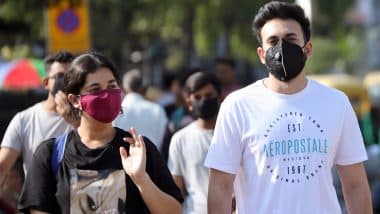Washington, November 20: When it comes to optimizing "longevity fitness" through attention to social, health, and wealth aspects of life, many Americans face intractable inequities based on the color of their skin, where they live, their sex, and who they love.
The COVID-19 pandemic has further demonstrated the additional impacts affecting these demographics through the increased number of cases and mortality rates. Also Read | Delhi-Mumbai Flight and Train Services May be Suspended by Maharashtra as COVID-19 Cases Surge in National Capital: Reports.
'The Impact of Diversity on Longevity Fitness: A Life-Course Perspective' -- the third report in a series developed by The Gerontological Society of America and supported by Bank of America -- documents the effects of these inequities and explores the beneficial efforts of corporations and other employers to enhance diversity and inclusion. Also Read | KTM 250 Adventure Motorcycle Launched in India; Check Prices & Specifications.
It uses the term longevity fitness to describe how people can thrive, not just survive, throughout increasingly long life spans by achieving social, health, and wealth equity.
"Our nation's diversity is one of its great strengths, but we have marginalized certain groups and made it difficult for them to accumulate financial, health, and social equity," said Richard W Johnson, PhD, of the Urban Institute, who chaired the workgroup that oversaw content development for the new publication.
"This report shows how government and business can work together to help everyone thrive throughout their lives," added Johnson. The report calls for deep cultural shifts in the place, race, gender, and sexual orientation/identity aspects of life. It states that in order to promote longevity fitness, the inherent biases in the ways people look at one another and treat each other must be addressed.
"With this research, The Gerontological Society of America has taken an important step to understand how to navigate our journeys in life better in an era of longer life spans, with a particular emphasis on diversity in our society," said Kai Walker, Inclusion Executive, Retirement and Personal Wealth Solutions, Bank of America.
"As we all navigate this current pandemic, this report -- together with our own research on life priorities and life stages -- provides actionable and inclusive guidance to individuals and families throughout their financial lives," added Walker.
Over the past three years, The Gerontological Society of America and Bank of America have explored the increasingly long life spans enjoyed by Americans through economic, fitness, and diversity lenses.
The 2018 report, "Longevity Economics: Leveraging the Advantages of an Aging Society," addressed the problems of systemic ageism and age discrimination and the need for policies and programs that recognize the reality of people living far past the historical retirement age of 65.
In 2019, "Longevity Fitness: Financial and Health Dimensions Across the Life Course" detailed how people can thrive, not just survive, throughout longer lifespans by making changes in their lives aimed at maximizing social, health, and wealth equity.
(The above story is verified and authored by ANI staff, ANI is South Asia's leading multimedia news agency with over 100 bureaus in India, South Asia and across the globe. ANI brings the latest news on Politics and Current Affairs in India & around the World, Sports, Health, Fitness, Entertainment, & News. The views appearing in the above post do not reflect the opinions of LatestLY)













 Quickly
Quickly


